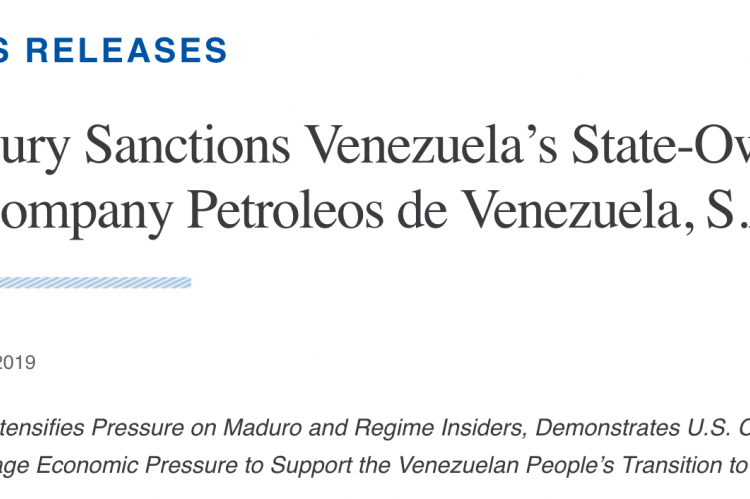This site's editor is glad to see that what is published here somehow becomes reality. In September 2018 we argued "SDN / SSI PDVSA, then negotiate", and a few hours ago U.S. Treasury sanctioned PDVSA (see below). Only thing to add is that in whatever talks / negotiations with Nicolas Maduro's regime ever to be had, only one goal ought to be pursued -in our view, and that is to remove his wretched regime from power. Next steps by the incoming Juan Guaidó's Venezuela administration should be: 1) probe all aspects of David Boies' PDVSA US Litigation Trust scam in Florida; 2) assign a new legal counsel in case against Trafigura, Glencore, Vitol, et al brought by PDVSA in Geneva. There's a huge amount of money that Venezuela could recover from there.
Treasury Sanctions Venezuela’s State-Owned Oil Company Petroleos de Venezuela, S.A.
Action Intensifies Pressure on Maduro and Regime Insiders, Demonstrates U.S. Commitment to Leverage Economic Pressure to Support the Venezuelan People’s Transition to Democracy
Washington – Today the Department of the Treasury’s Office of Foreign Assets Control (OFAC) designated Petroleos de Venezuela, S.A. (PdVSA) pursuant to Executive Order (E.O.) 13850 for operating in the oil sector of the Venezuelan economy. PdVSA is a Venezuelan state-owned oil company and a primary source of Venezuela’s income and foreign currency, to include U.S. dollars and Euros.
“The United States is holding accountable those responsible for Venezuela’s tragic decline, and will continue to use the full suite of its diplomatic and economic tools to support Interim President Juan Guaidó, the National Assembly, and the Venezuelan people’s efforts to restore their democracy,” said Secretary of the Treasury Steven T. Mnuchin. “Today’s designation of PdVSA will help prevent further diverting of Venezuela’s assets by Maduro and preserve these assets for the people of Venezuela. The path to sanctions relief for PdVSA is through the expeditious transfer of control to the Interim President or a subsequent, democratically elected government.”
As with previous OFAC designations of certain Venezuelan officials and their supporters, U.S. sanctions need not be permanent. Sanctions are intended to change behavior. The United States has made it clear that we will consider lifting sanctions for those who take concrete, meaningful, and verifiable actions to support democratic order and combat corruption in Venezuela, including PdVSA.
As Venezuela’s state owned oil company, PdVSA has long been a vehicle for corruption. A variety of schemes have been designed to embezzle billions of dollars from PdVSA for the personal gain of corrupt Venezuelan officials and businessmen. For example, a 2014 currency exchange scheme was designed to embezzle and launder around $600 million from PdVSA, money obtained through bribery and fraud. By May 2015, the conspiracy had allegedly doubled in amount, to $1.2 billion embezzled from PdVSA. Abraham Edgardo Ortega, a Venezuelan national who was PdVSA’s executive director of financial planning, pled guilty to one count of conspiracy to commit money laundering for his role in the billion-dollar international scheme to launder funds embezzled from PdVSA. In a separate case, U.S. prosecutors have alleged that, from 2011 to 2013, senior Government of Venezuela and PdVSA officials, including Nervis Villalobos, the former Venezuelan vice minister of energy; Rafael Reiter, who worked as PdVSA’s head of security and loss prevention; and Luis Carlos de Leon, a former official at a state-run electric company, sought bribes and kickbacks from vendors in exchange for helping them secure PdVSA contracts and gain priority over other vendors for outstanding invoices during its liquidity crisis.
Today’s action designating PdVSA follows a determination by Secretary Mnuchin pursuant to E.O. 13850 that persons operating in the oil sector of the Venezuelan economy may be subject to sanctions.
Concurrent with this action, OFAC is issuing general licenses that authorize certain transactions and activities related to PdVSA and its subsidiaries within specified timeframes.
As a result of today’s action, all property and interests in property of PdVSA subject to U.S. jurisdiction are blocked, and U.S. persons are generally prohibited from engaging in transactions with them.
For additional information about the methods that Venezuelan senior political figures, their associates, and front persons use to move and hide corrupt proceeds, including how they try to exploit the U.S. financial system and real estate market, please refer to FinCEN’s advisories FIN-2017-A006, “Advisory on Widespread Public Corruption in Venezuela,” and FIN-2017-A003, “Advisory to Financial Institutions and Real Estate Firms and Professionals.”
Identifying information and General Licenses relating to today’s announcement.

